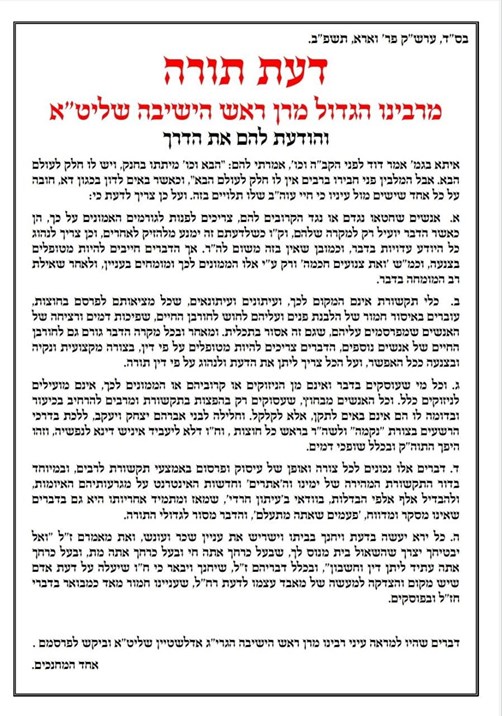איך מסבירים את הפער העצום בין האחוז הגבוה של משתמשים בטלפונים חכמים בתוך הציבור הדתי לבין האחוז הזעום של אלו שנעזרים באפליקציה של הגנה וסינון של תכנים פסולים? קבלו את רשימת התירוצים המליאה
(מקור)
* כי זה הורס את הפלאפון – עשרות אלפי אנשים, כולל כמה שאתה בטח מכיר, משתמשים באפליקציית ההגנה ונהנים מיכולותיה והמכשיר שלהם ממשיך לתפקד נהדר. אם יש הבדל בינה לבין יישומים אחרים זה רק בכך שרוב האפליקציות הן בונוס שימושי ונחמד שאפשר איתו ואפשר בלעדיו, אך סינון תכנים פסולים הוא עניין קריטי שאסור לוותר עליו.
* כי זה יזלול לי את הסוללה – כל אפליקציה צורכת סוללה. צריכת הסוללה של תוכנת הסינון זניחה לגמרי לעומת רוב היישומים האחרים שאנו רגילים להשתמש בהם.
* כי זה יפריע לי לגלוש בחופשיות ובמהירות ויחסום גם אתרים טובים – טכנולוגיית הסינון השתכללה והשתדרגה והגיעה לרמה מאוד גבוהה מאוד של דיוק. נכון, היא עדיין לא מושלמת. מה שתוכל לעשות הוא: א. לבחור בעצמך את רמת הסינון המתאימה לך. ב. אם היתה טעות באיבחון של אתר מסוים – תוכל לפנות למחלקת התמיכה והם יפתחו את הגלישה בו. אבל מעבר לכך גם אם אכן תשלם מחיר מסויים של חוסר נוחות או האטה, – שווה לשלם את המחיר הזה למען מטרה כל כך חשובה כמו אינטרנט נקי. גם לרחוץ ידיים מלוכלכות לפני הארוחה מאט את הגישה שלנו אל האוכל, ובכל זאת מי שבריאותו חשובה לו לא יחלום לוותר על השקעת השניות הללו כדי שלא ייכנס לתוכו משהו מזיק.
* כי זה עולה כסף – זה נכון. ממש כמו שגם האייפון החדש עלה 3000 ₪ וחבילת הגלישה שלו לא ניתנה במתנה. ובאופן הכי הגיוני גם ‘חגורת הבטיחות’ של הגלישה עולה כסף… ממש כמו כל מוצר איכותי ומשוכלל שהשקיעו מיליונים כדי לפתח אותו. אומנם מי שיתעקש על אפליקציות סינון חינמיות – ימצא, אבל הן חלשות ביותר ומספקות הגנה חלקית: לא כולל Wifi, אתרים מאובטחים (יוטיוב, למשל), אפליקציות ועוד.
* כי לא היה לי זמן לעשות את זה – כלל גדול בחיים אומר: למה שחשוב מוצאים זמן. אדם שהחליק במדריגות ושבר יד – ידחה מיידית את כל הפגישות והעיסוקים וירוץ לטפל בעצמו. צריך להיות לא נורמאלי כדי להגיד “בעוד חודש בדיוק יש לי יום חופש. אטפל בזה אז…”. להגיד “לא היה לי זמן להתקין הגנה” זה בערך כמו לומר “אקדיש זמן להתעטף במעיל כדי שהגוף שלי לא יתרטב ביום גשום, אבל לא מזיז לי שהנפש שלי תשחה בביוב”. זה נשמע לך הגיוני?! אגב, להתקין אפליקציית הגנה לא לוקח יותר מאשר כמה דקות.
* כי זה אחריות של ההורים שלי – בואו נהיה אמיתיים– ההורים שלנו אנשים מקסימים ומדהימים. אבל בקטע הזה הרבה מהם קצת ‘מעופפים’. הם עסוקים, אדישים, נבוכים, לא קלטו מה בדיוק הולך כאן… אתה, לעומת זאת, כבר יודע. אנחנו בסוג של מלחמה על הנפש שלנו ועל הנקיות שלה. אתה כבר לא ילד. אלו החיים שלך וזה העתיד שלך. אם אתה לא תיקח עליהם אחריות ותעשה את מה שצריך – אף אחד אחר לא יעשה את זה בשבילך.
* כי אני מאמין בחינוך להתמודדות ולא בבריחה ממנה – אתה צודק לגמרי. אלא שככה בדיוק מתמודדים! בחוכמה, בחשיבה קדימה ו”בתחבולות תעשה לך מלחמה”. כל מי שכבר התקין את ההגנה יודע שהיא לא מעלימה את הצורך בהתמודדות. היא רק הופכת אותה לשפויה יותר.
* כי בכל מקרה החסימות האלו לא שוות שום דבר ומי שרוצה ימצא את הדרך לעקוף אותן – אפליקציית ההגנה פותחה במשך שנים על ידי טובי המומחים, והיא הולכת ומשתכללת כל הזמן. האם זה אומר שהיא מושלמת ונותנת הגנה הרמטית? ברור שלא. אך מי שיתעקש בחיים על לא פחות מ-100% יימצא את עצמו בסוף בלי כלום. מה שבטוח זה שהיא עוזרת מאוד מהיתקלות לא מכוונת בתכנים פסולים ברשת, ומאפשרת גלישה חופשית מבלי לראות את מה שאתה ממילא לא רוצה לראות.
* כי אני לא צריך את זה. האתרים האלו לא מעניינים אותי בכלל – גם לנהג הכי טוב בעולם אסור לוותר על חגורת בטיחות, וגם המשפחה הכי אחראית בעולם לא תגור בקומה 17 בלי סורגים על החלונות. אתה יכול לנהוג פרפקט ולגלות פתאום שהנהג שנוסע בכיוון הנגדי נרדם על ההגה ומתחיל לגלוש לכיוונך, ושמספיק רגע אחד של חוסר עירנות כדי שיקרו התרסקויות שאחר כך קשה לתקן. כביש האינטרנט מסוכן אפילו יותר. הוא מוצף בתכנים בעיתיים וזו הסיבה ש-94% מבני הנוער דיווחו שנתקלו בו בלי כוונה בתכנים פסולים. אם אין הגנה – גם מי שלא יחפש את זה – בוודאות יימצא. מעבר לזה חז”ל היו מאוד נחרצים כשקבעו “אין אפוטרופוס לעריות”. אין אדם בעולם שיכול לומר בוודאות “לי זה לא יקרה”.
כי לא נעים לי מהחבר’ה – סליחה, אבל אתה לא מעודכן. המון חבר’ה צעירים בדיוק כמוך מצטרפים בכל שבוע ומתקינים. גם אם נדמה לך שבסביבה שלך זה פחות מצוי, אדרבה, קח אחריות ותהיה מוביל ודוגמא לאחרים!
כי אני בת, ודווקא בנים הם אלו שנופלים בדברים כאלו… – מחקרים עדכניים מגלים שגם בנות הן בני אדם! גם להן יש יצרים ורגעים של חולשה, וגם הן עלולות להיחשף עם או בלי כוונה לדברים בעיתיים. המספרים המדוייקים מדברים על 33% מהבנות הדתיות שנחשפות לאתרים לא ראויים (כפול מאשר אחוז הבנות החילוניות!).
* כי אין לי מושג איך עושים את זה – זה פשוט להפליא. נכנסים לאתר של רימון או נטספארק, מורידים את האפליקצייה ומתקינים. צריך בשביל זה שני דברים: פרטי אשראי לתשלום, ומישהו אחר שיוכל לדעת את הסיסמא (ולא אתה) כדי שההגנה תהיה אפקטיבית וללא אפשרות של הסרת האפליקציה.
בשורה התחתונה, גלישה באינטרנט היא דבר מדהים ושימושי לחיים, ובלבד שנדאג לנקות ממנו את הזוהמה ולשמור על רמה איכותית וגבוהה של תכנים. לכו על זה.

